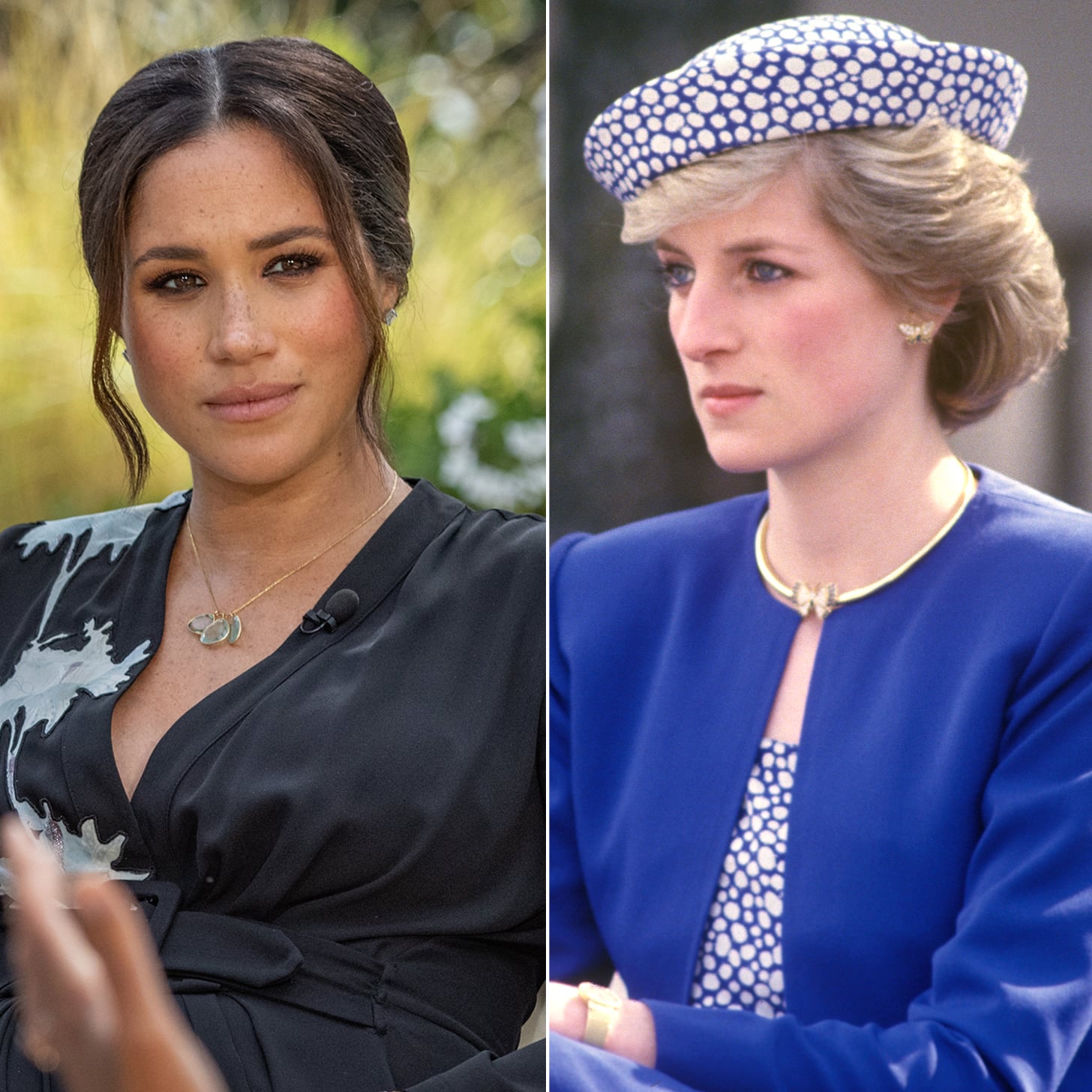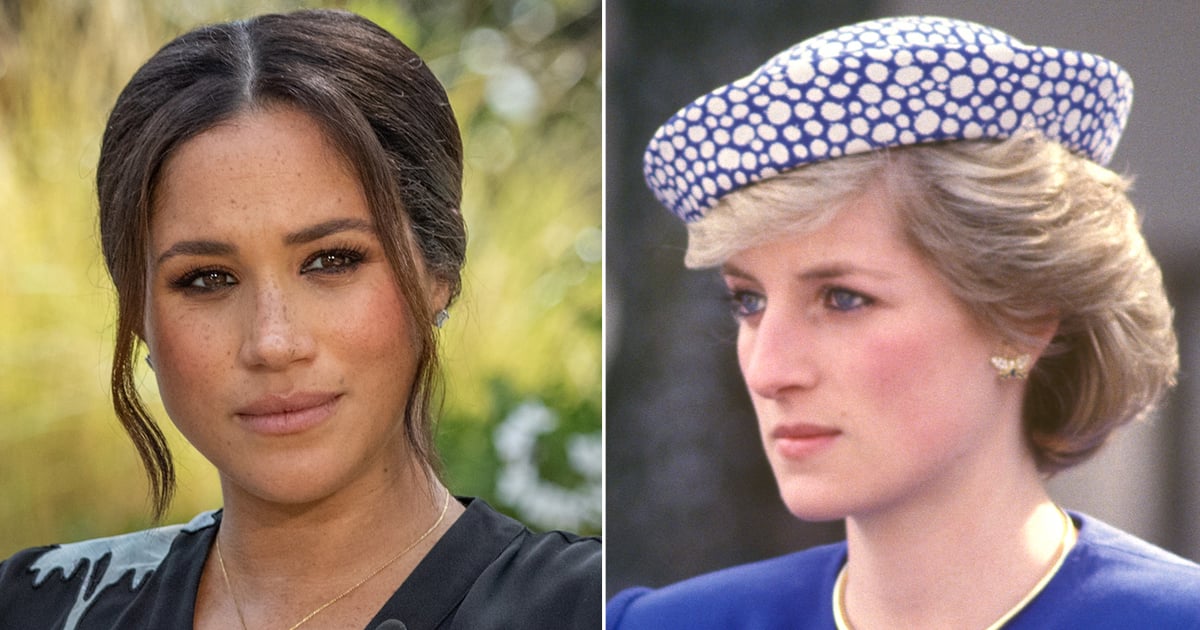
When Meghan Markle and Prince Harry’s tell-all with Oprah Winfrey was first announced in February, people immediately started making comparisons to Princess Diana’s famous November 1995 interview with Martin Bashir following her separation from Prince Charles. But the similarities became even more striking when it aired on March 7 and Diana’s interview was featured on Netflix’s Diana: The Interview That Shook the World on April 11. In addition to the matching bold eyeliner looks and Meghan wearing one of Diana’s bracelets, both Meghan and Diana had similar revelations about their time as royals and how the intense pressure from the palace and British press affected their mental health. Even though it’s been nearly 26 years since Diana’s interview, it’s alarming to see that not much has changed since then. Hopefully, Harry and Meghan’s tell-all serves as a wake-up call for both the palace and the British media.
On Joining the Royal Family
Diana: “At the age of 19, you always think you’re prepared for everything, and you think you have the knowledge of what’s coming ahead. But although I was daunted at the prospect at the time, I felt I had the support of my husband-to-be.”
Meghan: “I will say I went into it naively because I didn’t grow up knowing much about the royal family. It wasn’t something that was part of conversation at home, it wasn’t something that we followed,” she said. “I didn’t research about what that would mean. I’ve never looked up my husband online. I just didn’t feel the need to because everything that I needed to know, he was sharing with me.”
On Not Receiving Any Support During Their Royal Transitions
Diana: “No one sat me down with a piece of paper and said: ‘This is what is expected of you.’ But there again, I’m lucky enough in the fact that I have found my role, and I’m very conscious of it, and I love being with people,” Diana said. “It was isolating, but it was also a situation where you couldn’t indulge in feeling sorry for yourself: you had to either sink or swim. And you had to learn that very fast.”
Meghan: “Unlike what you see in the movies, there’s no class on how to speak, how to cross your legs, how to be royal,” Meghan said as she recalled googling the British national anthem the night before a royal engagement.
On Struggling With Unwanted Media Attention
Diana: “The most daunting aspect was the media attention, because my husband and I, we were told when we got engaged that the media would go quietly, and it didn’t; and then when we were married they said it would go quietly and it didn’t; and then it started to focus very much on me, and I seemed to be on the front of a newspaper every single day, which is an isolating experience, and the higher the media put you, place you, is the bigger the drop. And I was very aware of that.”
Meghan: “I would sit up at night, and I was just — I don’t understand how all of this is being churned out — and again I wasn’t seeing it — but it’s almost worse when you feel it through the expression of my mom or my friends or them calling me crying like, ‘Meg, they’re not protecting you.’ And I realized it was all happening just because I was breathing.”
On How the Royal Family Failed Them During Their Time of Need
Diana: “Maybe I was the first person ever to be in this family who ever had a depression or was ever openly tearful. And obviously that was daunting, because if you’ve never seen it before how do you support it?” Diana said. “Well, it gave everybody a wonderful new label — Diana’s unstable and Diana’s mentally unbalanced. And unfortunately that seems to have stuck on and off over the years.”
She continued, “When no one listens to you, or you feel no one’s listening to you, all sorts of things start to happen. For instance, you have so much pain inside yourself that you try and hurt yourself on the outside because you want help, but it’s the wrong help you’re asking for. People see it as crying wolf or attention-seeking, and they think because you’re in the media all the time you’ve got enough attention, inverted commas. But I was actually crying out because I wanted to get better in order to go forward and continue my duty and my role as wife, mother, Princess of Wales. So yes, I did inflict upon myself. I didn’t like myself, I was ashamed because I couldn’t cope with the pressures.”
Meghan: “Look, I was really ashamed to say it at the time and ashamed to have to admit it, to Harry especially, because I know how much loss he’s suffered. But I knew that if I didn’t say it that I would do it — and I just didn’t want to be alive anymore. And that was a very clear and real and frightening constant thought,” she admitted. “I went to one of the most senior people to get help. I share this because there are so many people who . . . are afraid to voice that they need help, and I know personally how hard it is to not just voice it, but when you voice it, say no . . . [Going to a hospital] is what I was asking to do. You can’t just do that, I couldn’t call an Uber to the palace, you couldn’t just go.”
On Why They Decided to Step Back From the Royal Family
Diana: “The pressure was intolerable then, and my job, my work was being affected. I wanted to give 110 percent to my work, and I could only give 50. I was constantly tired, exhausted, because the pressure was just, it was so cruel. So I thought the only way to do it was to stand up and make a speech and extract myself before I started disappointing and not carrying out my work. It was my decision to make that speech because I owed it to the public to say that, you know, ‘Thank you. I’m disappearing for a bit, but I’ll come back.'”
Meghan: “We never left the family. We were saying, ‘OK, if this isn’t working for everyone, we’re in a lot of pain, you can’t provide us with the help that we need, we can just take a step back. We can do it in a commonwealth country.’ We suggested New Zealand, South Africa.”
On Why They Finally Chose to Speak Out
Diana: “Maybe people have a better understanding, maybe there’s a lot of women out there who suffer on the same level but in a different environment, who are unable to stand up for themselves because their self-esteem is cut into two.”
Meghan: “As an adult who lived a really independent life to then go into this construct that is different than I think what people expect it to be, it’s really liberating to be able to have the right and the privilege in some ways to be able to say yes, I’m ready to talk.”
